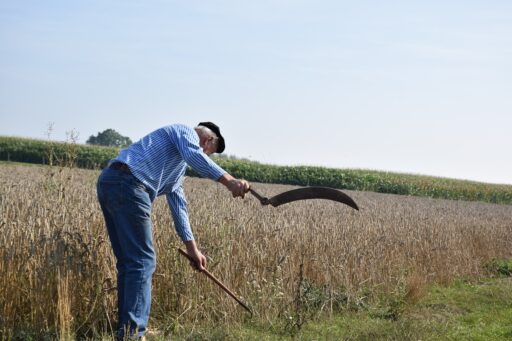When I teach modern poetry, it’s a relief to turn to Robert Frost, whose poems are engaging and accessible. I begin my course with T. S. Eliot and Ezra Pound, and they are hard for students to respond to. The literary allusions, foreign-language phrases, jarring transitions and discontinuities: even experienced students have trouble making their way through The Wasteland and the Cantos. With W. B. Yeats, third on the syllabus, there’s Irish myth and political history and his esoteric system of symbolism. The first weeks often feel like exercises in trying to overcome impediments and obscurities.
Frost is different. I almost said “better,” and perhaps that is what I believe. I know all the modern poets well, and my copies of their books are filled with enthusiastic markings and annotations. But as I have grown older, I admit I have become less patient. The elite and coterie dimension of modern poetry tends to frustrate me, rather than appeal to and captivate me as it once did.
I should be more receptive, more tolerant. But maybe many of us tend to be in a hurry in our reading as we age: time is precious, what are we spending it on?
For me and my students, then, the modern poetry course picks up interest and energy when the syllabus brings us to Frost. Students are drawn to his diction, setting, and mood. They enjoy the poems, are curious about and intrigued by them, and we have spirited discussions and debates.
The irony that comes alive in the classroom, however, is that Frost turns out not to be easy at all. The lines, with their meter and rhyme, are so immediately alluring that we might not perceive how enigmatic they are.
I can point to Frost’s sonnet “Mowing” to explain what I mean. In the table of contents for A Boy’s Will, Frost inserted sentences of summary for each poem, including this one for “Mowing”: “He takes up life simply with the small tasks.” “Mowing” seems to express and explore this dictum—that what counts is a life of simplicity that’s grounded in basic duties and obligations. This is what is good, what we should strive for:
There was never a sound beside the wood but one, And that was my long scythe whispering to the ground. What was it it whispered? I knew not well myself; Perhaps it was something about the heat of the sun, Something, perhaps, about the lack of sound— And that was why it whispered and did not speak. It was no dream of the gift of idle hours, Or easy gold at the hand of fay or elf: Anything more than the truth would have seemed too weak To the earnest love that laid the swale in rows, Not without feeble-pointed spikes of flowers (Pale orchises), and scared a bright green snake. The fact is the sweetest dream that labor knows. My long scythe whispered and left the hay to make.
Some of my students do not know what a “scythe” is. I tell them that it’s a tool for cutting crops such as grass or wheat, with a long, curved blade at the end of a long pole attached to which are one or two short handles. “Fay,” I explain, is fairy. “Swale”: a low or hollow place, especially a marshy depression between ridges. “Orchises”: an orchid native to north temperate regions, characterized by a tuberous root and an erect fleshy stem bearing a spike of purple or pinkish flowers. But this is all I need to do: Frost has chosen words that are reassuring in their plainness.
When I read a poem like “Mowing,” with its cordial idiom, I appreciate the beauty of the phrasing, the fineness (as I hear it) of the sentiment. Yet then I pause: what is it that this line, and that one, and the next, mean? Each is lucid and resonant, but also cagey, indefinable.
“Mowing” is seductive and mysterious. The sounds, the whispering scythe—lovely and beguiling. Then again, a scythe, a tool, does not whisper, though the person who swings it might. We do not notice this nuance as we read and listen to the poem. That only comes later when we linger over the lines, reflecting on them. We wonder, what does this, what does that, mean?
The first six lines are a single sentence, as are the next six. Frost concludes with two sentences, each a line in length. The first of these sounds exactly right: “The fact is the sweetest dream that labor knows.” The challenge is to understand it. The final line is both decisive and haunting: “My long scythe whispered and left the hay to make.” Again, what is the meaning of it, and why has Frost chosen it to conclude the speaker’s story?
Frost gives “dream” an adjective, but not one to either “fact” or “labor.” For the second time, he says that the scythe is long. Is this significant? When we think about mowing a field of hay, we probably take for granted that we would use a tool with length and weight so that it makes a wide cut as it’s swung.
The speaker is a mower with his scythe. But he doesn’t depict himself in the act of mowing. The most personalized element is the whispering scythe. “The fact is the sweetest dream that labor knows”: I come back to this austere, cryptic line, which may strike us as an appropriate specimen for a course on the philosophy of language—Wittgenstein could have done a lot with it.
In the final line, it is the scythe that whispers—nothing about the speaker here, other than that this tool is his possession. The final phrase, “and left the hay to make,” creates an impression that is at once straightforward and profound. But if pressed, we would have to concede that it’s perplexing. The syntax indicates that it’s the scythe that does the leaving—leaving the hay to make…. To make what? To make how?
Frost is one of my favorite poets, but I have found that close reading him doesn’t lead to a statement of what his poems mean. I’m not certain we reach that point in our responses. Reading him closely is an activity that the movement and tone of his lines, sentences, and stanzas intimate we do not really need to do, for, so it seems, the meanings are felicitously there for us to take in, all along the way.
It’s uncanny: as we read, we sense, or think we know, what a Frost poem means. But its meaning is just beyond our summaries and descriptions. This is a poet who resists and evades close reading even as he invites and rewards it.
Frost is shrewd, sly, elusive, not penetrable. My students and I ask lots of questions about each of his poems and talk about the choices he has made. It’s an edifying literary experience. But this work of interpretation doesn’t capture what a poem by Frost is saying. The illumination we receive as readers is that he is saying something we will never get to the bottom of.
William E. Cain is Mary Jewett Gaiser Professor of English at Wellesley College, where he enjoys teaching courses on Ralph Waldo Emerson, Henry David Thoreau, and other American writers. His recent publications include essays on Edith Wharton and Ernest Hemingway.





